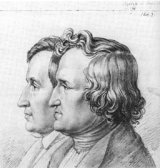Hans In Luck Page #2
"Hans In Luck" is a fairy tale by the Brothers Grimm that incorporates the old adage, "Ignorance is bliss". The story follows the character of Hans, a simple and content man who embarks on a journey after seven years of hard work. As the story progresses, Hans continually trades down from his initial reward of a lump of gold to seemingly lesser items, but with each trade, Hans feels luckier. His ultimate treasure becomes freedom and the simple joy of a carefree life, reaffirming his belief that he is the luckiest man on earth. The tale serves as a lesson on values, happiness and true wealth.
weeks old. Whoever roasts and eats it will find plenty of fat upon it, it has lived so well!’ ‘You’re right,’ said Hans, as he weighed it in his hand; ‘but if you talk of fat, my pig is no trifle.’ Meantime the countryman began to look grave, and shook his head. ‘Hark ye!’ said he, ‘my worthy friend, you seem a good sort of fellow, so I can’t help doing you a kind turn. Your pig may get you into a scrape. In the village I just came from, the squire has had a pig stolen out of his sty. I was dreadfully afraid when I saw you that you had got the squire’s pig. If you have, and they catch you, it will be a bad job for you. The least they will do will be to throw you into the horse-pond. Can you swim?’ Poor Hans was sadly frightened. ‘Good man,’ cried he, ‘pray get me out of this scrape. I know nothing of where the pig was either bred or born; but he may have been the squire’s for aught I can tell: you know this country better than I do, take my pig and give me the goose.’ ‘I ought to have something into the bargain,’ said the countryman; ‘give a fat goose for a pig, indeed! ‘Tis not everyone would do so much for you as that. However, I will not be hard upon you, as you are in trouble.’ Then he took the string in his hand, and drove off the pig by a side path; while Hans went on the way homewards free from care. ‘After all,’ thought he, ‘that chap is pretty well taken in. I don’t care whose pig it is, but wherever it came from it has been a very good friend to me. I have much the best of the bargain. First there will be a capital roast; then the fat will find me in goose-grease for six months; and then there are all the beautiful white feathers. I will put them into my pillow, and then I am sure I shall sleep soundly without rocking. How happy my mother will be! Talk of a pig, indeed! Give me a fine fat goose.’ As he came to the next village, he saw a scissor-grinder with his wheel, working and singing, ‘O’er hill and o’er dale So happy I roam, Work light and live well, All the world is my home; Then who so blythe, so merry as I?’ Hans stood looking on for a while, and at last said, ‘You must be well off, master grinder! you seem so happy at your work.’ ‘Yes,’ said the other, ‘mine is a golden trade; a good grinder never puts his hand into his pocket without finding money in it--but where did you get that beautiful goose?’ ‘I did not buy it, I gave a pig for it.’ ‘And where did you get the pig?’ ‘I gave a cow for it.’ ‘And the cow?’ ‘I gave a horse for it.’ ‘And the horse?’ ‘I gave a lump of silver as big as my head for it.’ ‘And the silver?’ ‘Oh! I worked hard for that seven long years.’ ‘You have thriven well in the world hitherto,’ said the grinder, ‘now if you could find money in your pocket whenever you put your hand in it, your fortune would be made.’ ‘Very true: but how is that to be managed?’ ‘How? Why, you must turn grinder like myself,’ said the other; ‘you only want a grindstone; the rest will come of itself. Here is one that is but little the worse for wear: I would not ask more than the value of your goose for it--will you buy?’ ‘How can you ask?’ said Hans; ‘I should be the happiest man in the world, if I could have money whenever I put my hand in my pocket: what could I want more? there’s the goose.’ ‘Now,’ said the grinder, as he gave him a common rough stone that lay by his side, ‘this is a most capital stone; do but work it well enough, and you can make an old nail cut with it.’ Hans took the stone, and went his way with a light heart: his eyes sparkled for joy, and he said to himself, ‘Surely I must have been born in a lucky hour; everything I could want or wish for comes of itself. People are so kind; they seem really to think I do them a favour in letting them make me rich, and giving me good bargains.’ Meantime he began to be tired, and hungry too, for he had given away his last penny in his joy at getting the cow. At last he could go no farther, for the stone tired him sadly: and he dragged himself to the side of a river, that he might take a drink of water, and rest a while. So he laid the stone carefully by his side on the bank: but, as he stooped down to drink, he forgot it, pushed it a little, and down it rolled, plump into the stream. For a while he watched it sinking in the deep clear water; then sprang up and danced for joy, and again fell upon his knees and thanked Heaven, with tears in his eyes, for its kindness in taking away his only plague, the ugly heavy stone. ‘How happy am I!’ cried he; ‘nobody was ever so lucky as I.’ Then up he got with a light heart, free from all his troubles, and walked on till he reached his mother’s house, and told her how very easy the road to good luck was.
Translation
Translate and read this book in other languages:
Select another language:
- - Select -
- 简体中文 (Chinese - Simplified)
- 繁體中文 (Chinese - Traditional)
- Español (Spanish)
- Esperanto (Esperanto)
- 日本語 (Japanese)
- Português (Portuguese)
- Deutsch (German)
- العربية (Arabic)
- Français (French)
- Русский (Russian)
- ಕನ್ನಡ (Kannada)
- 한국어 (Korean)
- עברית (Hebrew)
- Gaeilge (Irish)
- Українська (Ukrainian)
- اردو (Urdu)
- Magyar (Hungarian)
- मानक हिन्दी (Hindi)
- Indonesia (Indonesian)
- Italiano (Italian)
- தமிழ் (Tamil)
- Türkçe (Turkish)
- తెలుగు (Telugu)
- ภาษาไทย (Thai)
- Tiếng Việt (Vietnamese)
- Čeština (Czech)
- Polski (Polish)
- Bahasa Indonesia (Indonesian)
- Românește (Romanian)
- Nederlands (Dutch)
- Ελληνικά (Greek)
- Latinum (Latin)
- Svenska (Swedish)
- Dansk (Danish)
- Suomi (Finnish)
- فارسی (Persian)
- ייִדיש (Yiddish)
- հայերեն (Armenian)
- Norsk (Norwegian)
- English (English)
Citation
Use the citation below to add this book to your bibliography:
Style:MLAChicagoAPA
"Hans In Luck Books." Literature.com. STANDS4 LLC, 2024. Web. 21 Dec. 2024. <https://www.literature.com/book/hans_in_luck_2069>.




Discuss this Hans In Luck book with the community:
Report Comment
We're doing our best to make sure our content is useful, accurate and safe.
If by any chance you spot an inappropriate comment while navigating through our website please use this form to let us know, and we'll take care of it shortly.
Attachment
You need to be logged in to favorite.
Log In